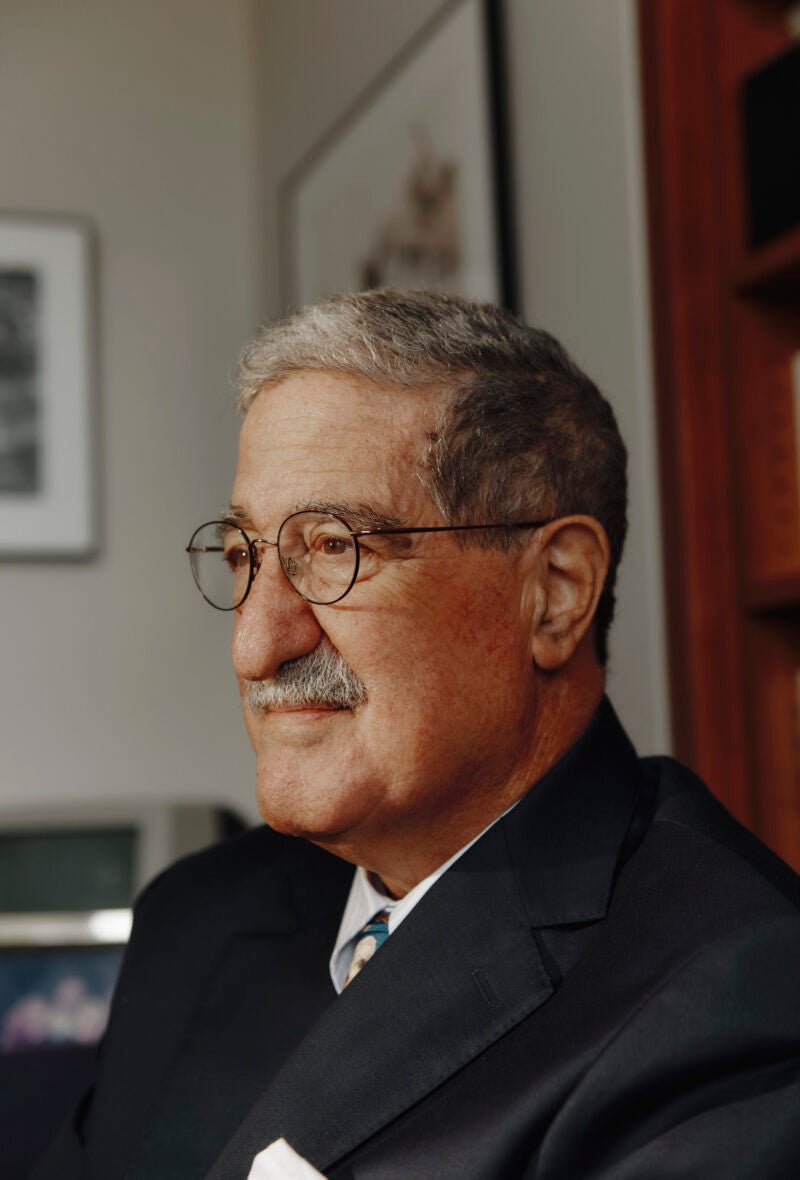Thirty years ago, I traveled to Holland with Bob Mnookin [’68] for a conference on negotiation and dispute resolution. He was the keynote speaker, and I, then a law student, remember him at the podium delivering an energetic introduction in flawless Dutch that delighted the crowd and elicited a rousing ovation. That is Bob — brilliant, funny, eager to collaborate with others and to meet them on their terms. Those qualities distinguished a more than three-decade teaching career at Harvard Law School, which ended last fall. Bob’s academic legacy is singularly impressive, but his personal qualities are what I will always remember.
Bob’s genius as a scholar was his interdisciplinary approach to the field of negotiation. No academic did more to integrate the insights from multiple disciplines — including behavioral economics, social psychology, cognitive psychology, game theory, industrial organization, institutional economics, and family law (to name a few) — into the study of conflict resolution. Those of us who knew him used to joke that Bob secretly wanted to be an economist and a psychologist and a diplomat, such was his appetite to draw from other fields. Before coming to Harvard permanently in 1993, he co-founded the Stanford Center on Conflict and Negotiation. At Harvard, he helped cement the Program on Negotiation’s status as the leading multidisciplinary center for the study of dispute resolution in the world. Bob’s courses consistently featured guest speakers who were giants in diverse fields. The seminars he hosted with Thomas Schelling, Howard Raiffa, Robert Putnam, Robert Wilson, Lee Ross, and James Sebenius (among many others) were transcendent intellectual experiences.
Few, if any, academics collaborated so deeply on scholarship with colleagues and students. Bob’s most acclaimed law review article (and still one of the most cited of all time) was “Bargaining in the Shadow of the Law: The Case of Divorce,” which, naturally, he co-wrote with a former graduate student and then fellow law professor Lewis Kornhauser. When I was a 2L, Bob invited me and fellow 2L Scott Peppet to co-write the book “Beyond Winning: Negotiating to Create Value in Deals and Disputes,” which Harvard University Press published in 2000. In all, Bob co-wrote more than 50 books and articles with other academics and students. He consistently demonstrated that collaboration and teamwork enhance academic excellence and the pursuit of truth.
“Bob was determined to promote a new generation of negotiation scholars.”
Bob’s generosity in sharing authorship also helped launch numerous academic careers. Bob was determined to promote a new generation of negotiation scholars. He is deeply committed to advancing human understanding of conflict resolution, and to teaching practical and concrete skills to help people improve at it. He understood that training others to be academics and teachers would have a force multiplier effect on the field. That proved true. At many law schools today, the professors teaching negotiation and dispute resolution are former co-authors with Bob or students of his.
Bob also is a gifted and funny teacher. The Negotiation Workshop he led became an essential winter-term course. The class was immensely popular and well regarded because it was multidisciplinary, interactive, and practical. In an academic discipline occasionally criticized for its naivete, students trusted Bob because he has real-world credibility. He served as co-arbitrator in the infamous multiyear intellectual property war between IBM and Fujitsu, and he successfully mediated bitter labor strife with the San Francisco Symphony and its musicians. Bob’s acumen at blending theory and practice showed students that they too could hold their own yet seek the common good even in ruthlessly competitive environments.
Bob’s personal attributes have been especially inspiring. He is intellectually fearless, open-minded, and enthusiastic to learn. I remember sitting with him once in the Science Center café, outlining the chapter titles of our nascent book, and he literally hooted aloud as ideas began to coalesce. When Bob was enthusiastic, you (and those nearby) knew it. He also questioned and tested longstanding premises in his field — and he was not afraid to ruffle feathers. Yet he was never dogmatic. If someone had an intriguing idea, Bob was the first to celebrate it.
Most importantly to me, Bob exemplified how to live life as a “win-win.” He has been married to his college sweetheart Dale for more than 60 years. They have two daughters (who are both extraordinarily successful in their own right) and four grandchildren. Anyone spending time with Bob and Dale can feel the devotion and warmth they have for each other and the fun they have together. That warmth radiated to law school students. Over the years, Bob and Dale welcomed many students into their home, acting as surrogate parents and inquiring about their lives outside the classroom.
Bob’s intellectual contributions will reverberate for years. His reflections on Jewish identity and analysis of Israeli-Palestinian issues have particular resonance today. For all his academic accomplishments — undergraduate and law degrees from Harvard, Fulbright scholar, Supreme Court law clerk, distinguished professor at Stanford and Harvard for five decades — Bob’s greatest legacy is that he modeled how to live life right. His personal example will sustain those of us fortunate to have shared time with him at Harvard.
Drew Tulumello ’96 is a litigation partner at Weil, Gotshal & Manges.
